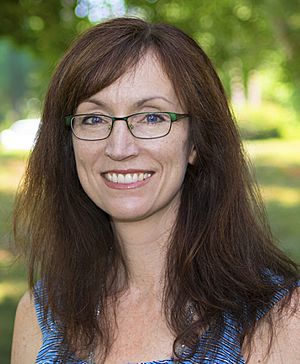Marcey Waters facts for kids
Quick facts for kids
Marcey L. Waters
|
|
|---|---|
 |
|
| Alma mater | University of Chicago (1997 PhD) |
| Known for | Bio-organic chemistry, Molecular recognition, Supramolecular chemistry, Peptide chemistry, Nuclear magnetic resonance, Peptidomimetics, and Combinatorial chemistry |
| Scientific career | |
| Fields | Bio-organic Chemistry |
| Institutions | University of North Carolina, Chapel Hill |
| Doctoral advisor | William Wulff |
Marcey Lynn Waters is a very important chemistry professor at the University of North Carolina, Chapel Hill. She is an organic chemist, which means she studies chemicals that contain carbon. Her work combines understanding how living things work (chemical biology) with how tiny molecules fit together (supramolecular chemistry).
Professor Waters has won many awards for her amazing research, her teaching, and for helping more women get involved in science. She even led a big group called the American Peptide Society for a few years.
Contents
Learning and Studying Chemistry
Marcey Waters finished her first chemistry degree at the University of California, San Diego in 1992. During her studies, she worked with a professor named Charles L. Perrin. They looked at basic ideas about how certain chemical structures, called aromatic compounds, behave.
Later, she went to the University of Chicago to get her advanced degree, called a PhD, in chemistry. There, she worked with Professor William Wulff. She studied a special chemical reaction called the Wulff-Dotz benzannulation reaction. This reaction helps make new chemical structures.
She earned her PhD in chemistry from the University of Chicago in 1997. After that, she did more research as a special fellow at the National Institutes of Health from 1997 to 1999. She explored how certain metal-containing molecules could act like natural enzymes.
Amazing Chemistry Research
In 1999, Professor Waters joined the University of North Carolina, Chapel Hill as a new professor. By 2018, she became a very distinguished professor there. Her research started by looking at how small forces, called non-covalent interactions, affect how peptides fold. Peptides are like tiny protein chains.
She studied how these forces, like pi-pi and cation-pi interactions, help peptides fold into specific shapes. This folding is super important for how peptides work in our bodies. Her work also helps us understand molecular recognition. This is like designing tiny chemical "locks" (peptide cavities) that can only fit certain "keys" (other organic molecules).
Professor Waters' team also studies how certain chemical tags, called methylation patterns, affect proteins and peptides. This research can help us understand diseases related to our genes, known as epigenetic diseases. She also worked with another professor, Nancy Allbritton, to study how certain proteins are broken down in cells.
Helping Others and Science
Mentoring Young Scientists
Professor Waters has spent a lot of time helping chemistry students. She especially helps those from backgrounds that might not usually get into science. She was part of a program called Project SEED by the American Chemical Society.
She has also helped start and support many groups on campus that encourage women in physical sciences. From 2007 to 2009, she mentored female scientists through an international program called TANDEMplusIDEA. She also served on the board for the Mesilla Chemistry Workshop for many years.
From 2011 to 2013, she was a UNC WOWS Scholar, which stands for "Working on Women in Science." Then, from 2013 to 2018, she was a faculty advisor for UNC WISE, a group for graduate women in science and engineering.
Working with Science Journals and Meetings
Professor Waters has also helped organize important science events and work with science journals. In 2007, she helped lead a big meeting about Dynamic Combinatorial Chemistry. The next year, she joined an advisory board for international meetings on macrocyclic and supramolecular chemistry.
In 2009, she was a special editor for an issue of Current Opinion in Chemical Biology. She continued to advise on macrocyclic and supramolecular chemistry meetings until 2015. In 2011, she helped organize another Mesilla Chemistry Workshop about how aromatic interactions work in chemistry and Biology.
In 2012, she was an editor for a book series called "Supramolecular Chemistry: From Molecules to Nanomaterials." In 2013, she co-chaired the American Peptide Society Meeting. She also helped edit a special article in Accounts of Chemical Research about aromatic interactions. From 2014 to 2020, she was on the editorial board for the Journal of the American Chemical Society, a very important science journal.
Awards and Special Honors
Professor Waters has received many awards for her contributions to science:
- 2017 - Elected President of the American Peptide Society
- 2018 - UNC University Award for the Advancement of Women
- 2017 - Fellow, American Association for the Advancement of Science
- 2015 - Mary Turner Lane Award, UNC
- 2014 - Tanner Award for Excellence in Undergraduate Teaching
- 2004 - Alfred P. Sloan Fellowship
- 2000 - NSF Career Award
- 1995–1996 - ACS Organic Division Research Fellowship
- 1992 - GAANN Fellow, Phi Beta Kappa
- 1991 - Howard Hughes Honors Research Fellowship (UCSD) and the NSF REU Fellowship (Columbia University)
 | James B. Knighten |
 | Azellia White |
 | Willa Brown |


